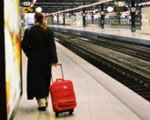 Go to main content
Go to main content
Archive Website of the UK government
Please note that this website has a UK government accesskeys system.
Main menu
Page menu
Travel and transport

Your rights and responsibilities as a rail passenger

When you buy a train ticket, you enter into an agreement with any train company whose services you use. This gives you the right to travel on the route allowed by your ticket. Find out more about your rights and responsibilities as a rail passenger.
Your agreement with the train companies
Your agreement with the train companies is based on the 'National Rail Conditions of Carriage'. These set out:
- the minimum level of service you can expect when travelling by rail in Great Britain
- your rights and responsibilities as a passenger
Your rights when you travel by rail
Contacting the train company

The National Rail Enquiries website has a list of train companies with links to their contact details
The rights listed below are a summary of the conditions of carriage for journeys in Great Britain. Each train operating company also has a passenger's charter, which may set out better, but not worse, terms than the conditions of carriage. You can get a copy of a passenger's charter from a station, a train company's customer relations department or its website.
Compensation for delays or cancellations
You're entitled to receive compensation if you're delayed by one hour or more because of a problem within the rail industry's control. This could include late-running engineering works, for example, but may not include vandalism or severe weather.
You should be refunded a percentage of the fare you paid. This means you should get at least:
- 20 per cent for a single ticket
- 10 per cent for one leg of a return ticket
- 20 per cent for a return ticket if both legs are delayed
You have the right to a full refund if your train is cancelled or significantly delayed and you decide not to travel. You can claim this refund for any type of ticket, as long as you didn't start your journey.
Help if you're stranded because of a delay
If your journey is disrupted for reasons within the rail industry's control, the train company has to help you get to your destination. If they can't use one of their trains, they should help by letting you travel by train on another route or arranging either:
- a taxi
- a rail-replacement bus service
- overnight accommodation
Reservations
If you make a seat reservation, you have the right to sit in that seat. If you have to stand for all or part of your journey, you're entitled to compensation and the reservation fee, if any, is refunded.
Similar arrangements apply if you book a sleeping-car berth or cycle space that can't be provided when you travel.
Access to the station or the train
If you're disabled or have reduced mobility, you can ask the train company for help during your journey with:
- access to stations
- changing platforms
- ramps for getting on and off trains
To arrange this help, contact the train company that manages the station where your journey starts. Try to give at least 24 hours' notice.
Your responsibilities when you travel by rail
Along with your rights, you have certain responsibilities when you travel on the railways.
Have a valid ticket
Make sure you have enough time to buy your ticket. Don't get on a train without a ticket, even if there's a long queue at the ticket office. If you do, you may be asked to pay the full 'anytime' fare or a penalty fare.
You must have the right ticket for your journey. Make sure your ticket:
- shows the correct details for your journey
- can be used on the routes, trains and during the time you intend to travel
- isn't damaged or changed
- is kept safe - if you lose it or it's stolen, you can't travel
Show your ticket when asked. If you bought your ticket with a Railcard, you must show this too.
Boarding and changing trains
You're responsible for boarding the right train and travelling in the right part.
Make sure you:
- get off the train and change at the right station
- leave enough time to change trains
- keep your luggage with you at all times
- sit or stand in first class only if your ticket allows
The train company isn't responsible for any delay or loss if you haven't followed this guidance.
Check your luggage allowance
You should check how much luggage you can take on board the train. You're responsible for anything you take on board, including cycles or animals and must make sure they don't harm other people or damage the train.
Label your property with your name and contact details. The train company isn't responsible if you lose your luggage or it's stolen. Train companies may charge you a fee to return lost property.
How to make a complaint about rail services
Follow the link below for advice on how to make a complaint if you aren’t happy with the service provided by the train company.
 Facebook
Facebook Twitter
Twitter StumbleUpon
StumbleUpon Delicious
Delicious Reddit
Reddit
